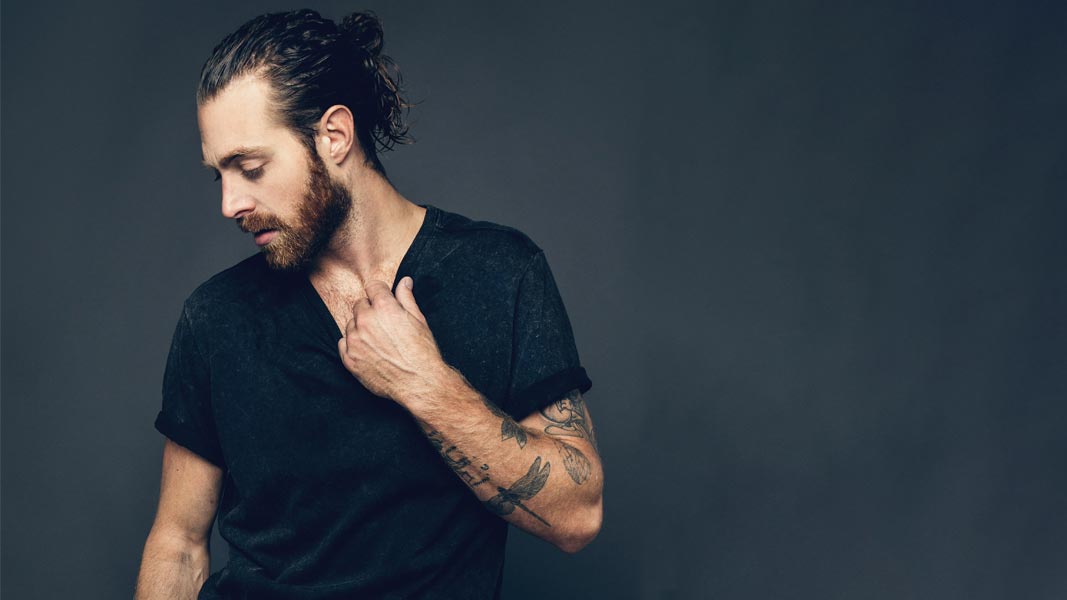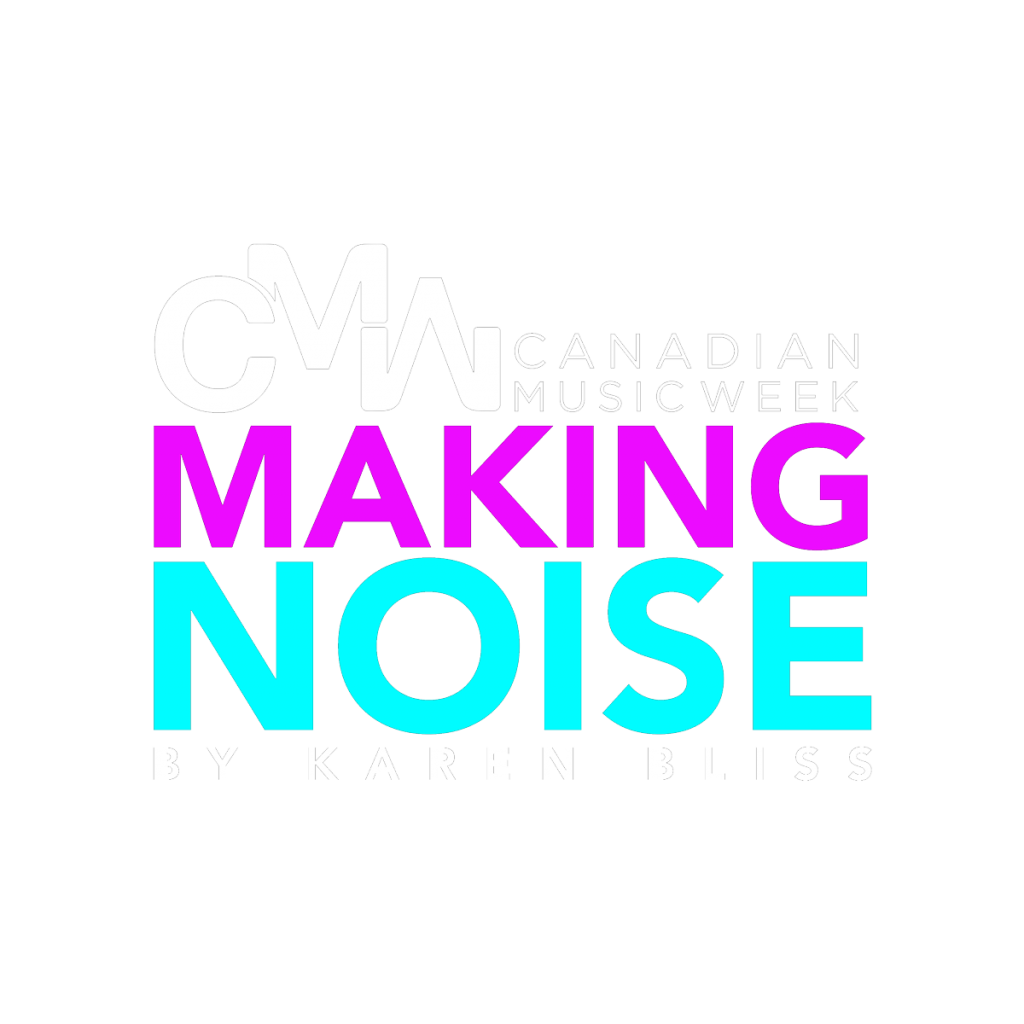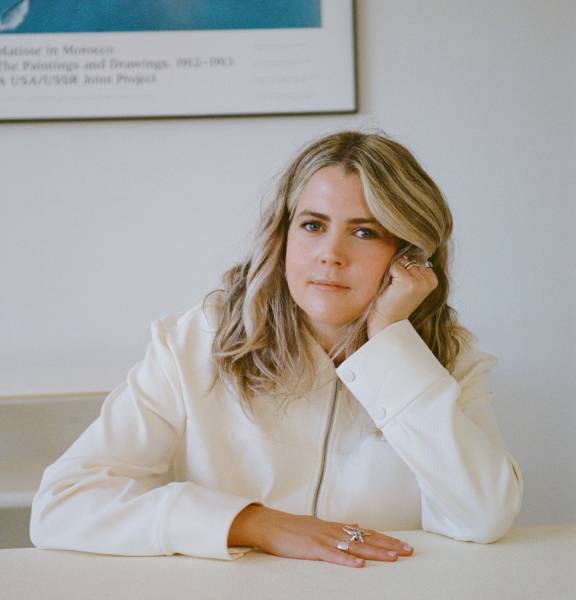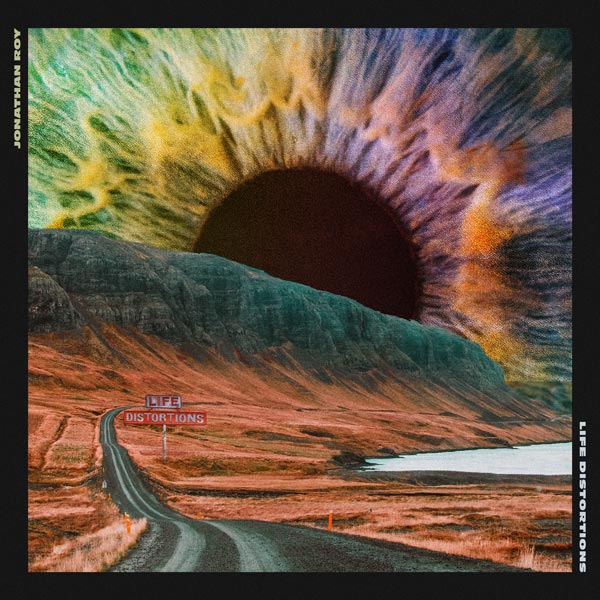
Like the cover art of Jonathan Roy’s new 8-song album, Life Distortions, it’s been a long road to that giant colourful sunburst, over some rocky terrain and up some mountains – literally. An avid outdoorsman, the Quebec-born alt-soul singer does rock climb, figuratively and metaphorically.
His songs are intense. Just listen to platinum-certified “Keeping Me Alive” —whose live acoustic version has over 100 million plays on YouTube — gold-certified “Lost,” or a relationship song like “Hate That I Love You,” full of internal conflict and all found on his 2021 EP, My Lullaby. It’s like every word is escaping his body to freedom, a release of what compelled him to write the lyrics. Roy has that effect with cover songs too, carefully chosen.
Roy, who lives on a little farm just outside Montreal, is not new to music, but it wasn’t his obvious destiny.
The 34-year-old was born into a famous hockey family — his dad is Hall of Famer and 4x Stanley Cup winner Patrick Roy, goalie for the Montreal Canadiens and then Colorado Avalache — and played for the QMJHL’s Quebec Remparts in 2008-09 which his father coached. But in his teens, he started putting poetry to music, and, when the NHL wasn’t in the cards for him, released his first album independently, 2009’s What I’ve Become, which he followed with 2010’s Found My Way, then the francophone La Route in 2011. In 2012, he took on the role of Raphaël in the stage musical Don Juan, the same year his dad introduced him to Quebec pop music icon Corey Hart.
Hart had his own indie label, Siena, distributed by Warner Music Canada, and the “Sunglasses At Night” hitmaker took the younger Roy under his wing, writing many of the songs, among them 2015’s pop single, “Daniella Denmark” and 2016’s reggae-lilt “You’re My Ace.” Both appear on Roy’s fourth album, 2017’s Mr. Optimist Blues, and but none of the songs had the intensity and rawness and soul that would come after he took off for the U.S. in an RV searching for something — happiness, himself.
After stopping in Arizona and Utah, he was camping on the Pacific Coast Highway in Los Angeles, when Warner suggested he meet up with Canadian producer and songwriter Brian Howes (Hinder, Skillet, Nickelback) who was in Malibu at the time. The first song they co-wrote together — with Jason Van Poederooyen (Boys Like Girls, Hinder) — was “Keeping Me Alive,” a lyric full of self-reflection and vulnerability, but includes the motivational words: “Your fueling of the flames gonna show you what I’m made of.”
With renewed passion for music, Roy continued writing with Howes and others on what would become Mr. Lullaby.
His music has also had an unexpected impact. Dr. Mary Galloway, a U.S.-based industrial and organizational psychologist, was going through an exceptionally rough time when she heard Roy’s version of Sia’s “Breathe Me” in October 2020 and the words and his delivery helped rework her thinking. She has since designed an online course for the University of Virginia School of Medicine and School of Nursing called Home of Compassion Fatigue: Prevention & Recovery with Jonathan Roy, using the music of My Lullaby to aid caregivers.
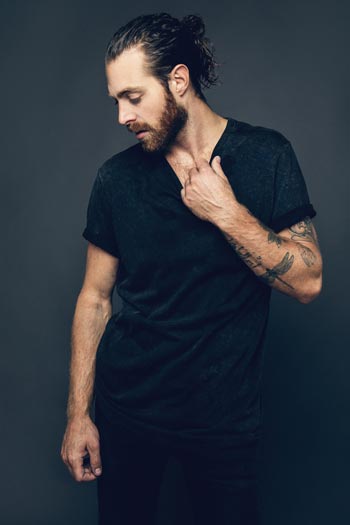
“We’re the first people ever to meld education and art to promote healing and wellness, so we made history on January 10th of 2022,” Dr. Galloway says in a YouTube video of her with Roy and his bandmates about her new digital course.
One comment under the clip states, “I’ve been using Jonathan’s music as therapy and anxiety relief for a couple of months now.”
On the IilioHM web site, Dr. Galloway’s new company, the synopsis says, “The course uses musical analysis, research, and personalized journal exercises to assist learners in exploring preventative strategies and recovery techniques to remedy the harsh symptoms of Compassion Fatigue – the cost of caring.”
With the astounding success of “Keeping Me Alive” and the encouraging support of his other releases and videos — including hits at Quebec radio, according to Le Palmarès chart (“…Alive” and “Lights of Los Angeles” No. 1 and “Lost,” No. 5) — Roy got to work on his next album, which he mainly co-produced with Howes and his drummer Marc Beland, and co-wrote with the pair, in addition to keyboardist Caudler Nash, and a few others.
In 2022, “To Be Real” and “21 Days” were released as preview tracks for Life Distortions, followed by the first official single, in November, a left-field playful pop song “Stay in Bed and Fuck (While The World Burns),” which was serviced to radio in Quebec and went top 10. The album Life Distortions came out in February on Roy’s O’Bannon Records (distributed by The Orchard).
A new song and acoustic performance video for “Back To The Moon,” to be included on a forthcoming deluxe version of Life Distortions, will drop April 21.
Roy is managed by Paul Jessop of PJME, who worked for Universal Music Canada for 25 years, as both vice-president of national promotions and director of A&R. Shelter Talent Agency’s Fabien Dambrine from Shelter Talent Agency) is his European agent. And Jean-Sebastien Hebert -Brunelle of Fierce Talent Agency handles Quebec.
CMW’s Making Noise spoke with Jonathan Roy and Paul Jessop together at Toronto’s Bar Raval about why it’s now working.
Reading some of the comments under your “Keeping Me Alive” and “Lost” videos, your music is helping people, maybe even saving some. After Dr. Galloway heard your version of Sia’s “Breathe Me,” she designed an entire course to help caregivers deal with “compassion fatigue,” using your music. How does that make you feel?
Jonathan Roy: When I was travelling and I took some time for me, I realized that music was essentially saving my life, making me have a purpose in life and healing me every day that I do it. And so, for me to be healed by my own art, and then to see other people being healed by it, is completely mind-blowing. It goes far beyond making a career or making money. It’s very special, very fucking special.
KB: Why is your music connecting now? What changed?
JR: Honestly, I don’t know what’s necessarily going on that’s different. But within me, I’m a lot more honest in my art and that’s coming off in a more authentic way. I think that’s what’s connecting with people.
KB: You were disillusioned with music. What drew you back?
JR: I had never discovered myself as a human being. I went from hockey to music. Since I was a little kid, my grandma was telling me, ‘We’re going to buy an RV and tour around. We’re going to see the world together.’ I had that in my head since I was a little kid. And so I was like, ‘You know what? I’m going to fucking do it. I’m going to buy an RV.’ Living here in Toronto, sold everything, hit the road.
KB: You were by yourself?
JR: I was with my dog, Rocky. My wife came a good part of the trip as well. And this went on for a good three years of doing six months in the States, coming back. I was just figuring out who the hell I was outside of music, outside of hockey, outside of my circle. It felt really good. It was also really scary, especially at a time where I was with a major record label. I’m talking more career-wise because personally I was free to roam. I owned the little condo and that was it. But, musically, in my career, I had no idea where it was headed.
KB: Was there a clean break with Corey and Warner?
JR: Warner let me go, and then Corey and I decided to split. That’s pretty much it. Super clean. No problems.
KB: When you connected with Paul were you hesitant about the business side?
JR: Well, I was with Darren Gilmore [president, Vancouver’s Watchdog Management]. I don’t think he and I really understood each other. Whatever he does with other artists, super great. For me, it wasn’t working. I was actually looking for Paul to work with me for radio.
Paul Jessop: Darren had called me at one point mid-2019, but at the time I had a commitment with [the record label] Big Machine, and I didn’t want to take on too many things. I was really surprised by the material, but even more enamored with a live acoustic version that he did of “Keeping Me Alive” because the video had just come out, and I found myself watching it four or five times. Then, we met a month or two after that. My commitment was done [with Big Machine] and we started speaking to each other. We hooked up in Montreal at a café and realized that we had the same vision about where it should go.
KB: What came through in that first meeting with Jonathan?
PJ: To me, it was about the honesty. That came through in our conversation and realizing, as well, that I had no clue that he didn’t write a lot of the stuff from before. He would dabble, but he had a lot to say. And now, being on his own, he was like, ‘It’s my message. I’ve got to put it out. It’s on me.’ It came from such an honest place. I saw how people reacted. We read the comments. He’s got the ability to convey the message through his lyrics and through his voice and through his tone. I’ve never used Google Translate so much in my life to understand some of the messages that people send [in different languages from around the world].
KB: Even though you were in radio for much of your career, you don’t have a radio promoter on Jonathan’s team outside Quebec [Simon Robitaille of Taxi Promo]. Why?
PJ: It’s certainly a live thing but it’s visual thing. Our numbers outside of Canada are really interesting. The story’s happening outside. And I think a lot of it has to do with people being able to almost physically or mentally feel what’s being said, without necessarily knowing the meaning of it. This is why we do so many performance videos because people relate to it. They’re like, ‘Oh, my god, this is my mantra; I listen to it every day.’ And I could see, because of the analytics, the amount of unique listeners or people that keep going back. They put it in their own playlist. It’s the same thing for streaming. We see a lot of those numbers come from repeat and organic use. I think now the DSPs [digital service providers] are starting to see that Jonathan has built a very loyal audience in a very organic way. The companies reaching out to us are smaller label, distribution companies, as they see the organic growth in the last 3-plus years. That is something they can easily access through systems like Chartmetric, and others like it.
We play a content game. We try to regularly release videos, mostly live videos, acoustic performance videos. Sometimes, we’ll just release it to YouTube. Sometimes, we feel that the audio is good enough for us to put on the DSPs if we’re getting a huge demand. That is another thing that we’re able to do. We can decide at any point in time, we want to shoot a video. We put our team together; we do it, we fund it. We’re very thankful for FACTOR and [Radio] Starmaker [Fund] but if we decide to shoot a video, we shoot it. We will most probably do videos for all of the songs.
KB: You have done this independently. You didn’t go back to a major.
PJ: Everything we do, we discuss, the two of us. “There’s some action happening. Here’s where our numbers are pointing.’ We‘ve had an American marketing team for a few years., Livia Tortella with Black Box. They do a great job for us. I mean, it’s not magically happening. A lot of people are reaching out and we do have somebody in Europe helping us out right now [Decent PR UK and in France LA Mission].
JR: It’s fun too because these are people that really believe in what we’re doing. That goes a long way. So we’re going out to Europe. This is a completely new market for us. We’re super excited.
KB: I drove you around to meet managers and agents in Toronto when you first started working with Corey. You sang for them on acoustic guitar. Just you and your voice. Raw, soulful. But your first recorded music with Siena and Warner was cleaner, more pop.
JR: 100%. We were learning. The thing that was amazing with Corey was that we were trying to figure it out and Corey was doing the best he could to figure it out with me.
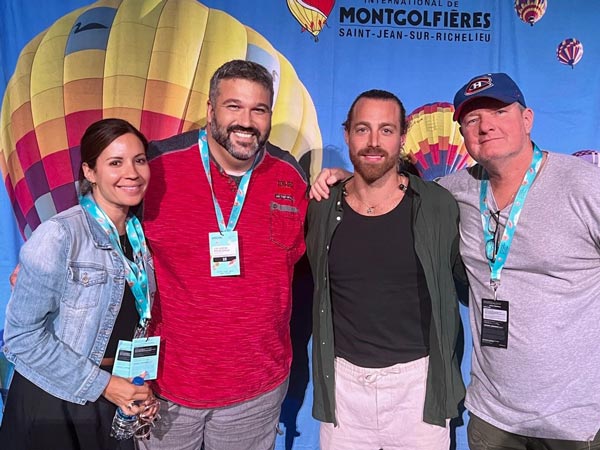
KB: You were a late bloomer in a way to music because of hockey. You didn’t come up through the clubs so you needed this growth period.
JR: Exactly. And I needed to do it by myself. That was the huge thing. As much as your record label thinks that you should do something or your friends, your parents or your mentor, it actually has to come from within. And if it’s not there, then it’ll be very complicated for everyone on the team because you don’t know what you want and you don’t know where you’re going.
KB: So you’re a nomad in this RV, hiking, rock climbing, then on one of the trips you end up camping on the Pacific Coast Highway in LA. You get in the studio Brian Howes and the first song you wrote together was “Keeping Me Alive,” which now has 100 million views. Clearly, when you started connecting with yourself, you started connecting with people.
JR: It’s working. It’s crazy.
KB: On Life Distortions, you’re talking about things that men don’t usually express. Emptiness. Pain. Mental health. Loss, in particular, comes up a lot – never mind you released a song actually called “Lost” in 2021. But on the new album, there’s “Hold On ‘Til I Break,” “21 Days” and “Still Holding On.”
JR: I was lost. I was trying to figure things out. Even my family didn’t know how sad I was. Corey didn’t even know how hard it was for me in my head. I’m starting to understand it, that this is the kind of person that I am. I’m going to have ups and downs, and I do struggle with happiness, and I have friends that struggle with happiness, and I’m there trying to support them, and they’re trying to support me. We’re all there to support each other.
KB: Do you find it’s a myth that guys don’t open up to each other about their struggles?
JR: In general, people are opening up a lot more, whether it’s with mental illness, whether it’s with sexuality, whether it’s with whatever. People are putting the image and ego down a bit so that they can be real and honest because hiding behind shit is really hard, and you will drown yourself and you will kill yourself, if you are not who you are. It’s important in 2023. I think the generation under me has started this process for us of being open and talking about so much. It’s amazing. It’s beautiful.
It’s really hard because in early years doing interviews was scary because you were afraid to be judged. An image was so important. If you said one thing that was wrong, you could ruin your whole career. I think we’re over that. I think people now can understand that we’re all different. We all go through shit, and we’re all allowed to have our ups and downs. So I’m all for it, fuck, yeah. I think people, not just men, not just women, everyone should be able to speak their truth, and, especially, about their mental health and how they’re dealing with life because it’s fucking hard. Even if you have millions of dollars in the bank, even if you’re married and you have beautiful kids, happiness is hard.
KB: That said, your single “Stay in Bed and Fuck” is different. It’s fun. It’s free. It’s pop. The video is funny. And then you have the album’s opening track, “Ayahuasca (Lay Me Down),” which pretty much lets the listener know who you are in the very first line: “I’ve been getting high on Ayahuasca / Hiding down below I thought I lost ya / Opened up mind then I found ya / I’m out of my system in beautiful rhythm.”
JR: That was a start to the whole process of the album. I went and did a [ayahuasca] ceremony, and it changed my life. That’s what started this whole album. Because I had a strange relationship with love. Loving myself, loving people, accepting my life. All these songs, essentially, are about love and my relationships with love or towards somebody else. Love is a weird thing. It’s something that we don’t understand and we can’t even try to comprehend. It is. It just is.
You sold out a Quebec tour and are now heading overseas. What about the rest of Canada?
JR: For shows in Canada, it’s going to come slowly. We were also in Covid, and I was with Jeff Craib, with Feldman [Agency], for almost eight years and we just decided to let each other go. So we’re going to go and find another agent here in Canada because I think we have fans. I’ve done across Canada a couple of times, and there’s definitely a market for me.
KB: Curious, where’s the RV now?
JR: It’s in the front yard. It’s rusting away, rotting away. We had a blast. We did Mexico, all of Canada, the States. We picked up camping again and it’s a lot of fun.
KB: Maybe in years to come you can auction off parts for charity. What’s your hope for this album?
JR: We’re making music; we’re having fun; we’re doing our thing. Paul and I are very comfortable where we’re at. We have control of the operation. We push ourselves and we thrive to push this music outside of Quebec, out of Canada. The start is the Europe tour. Slowly we’re going to keep growing, just making content.


